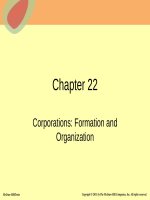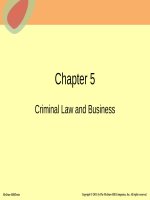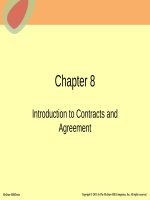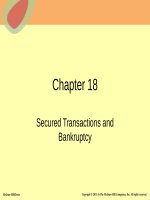- Trang chủ >>
- Thạc sĩ - Cao học >>
- Luật
Lecture Dynamic business law, the essentials (2/e) - Chapter 6: Tort law
Bạn đang xem bản rút gọn của tài liệu. Xem và tải ngay bản đầy đủ của tài liệu tại đây (233.33 KB, 28 trang )
Chapter 6
Tort Law
McGrawHill/Irwin
Copyright © 2013 by The McGrawHill Companies, Inc. All rights reserved.
Tort
Definition: A civil wrong or injury to
another, other than breach of contract,
giving the injured party the right to bring a
lawsuit against the wrongdoer to recover
compensation for economic and/or
physical damages
62
Goals of Tort Law
• Provide compensation for injured parties
• Maintain order in society by
discouraging private retaliation by
injured parties
• Give citizens a sense that they live in a
just society
63
Classification of Torts
• Intentional Torts—Occur when defendant takes
action intending that certain consequences will
result, or knowing they are likely to result
• Negligent Torts—Occur when defendant acts in
a careless way that subjects other people to an
unreasonable risk of harm
• Strict Liability Torts—Occur when defendant
undertakes an “inherently dangerous” action (an
action that cannot be undertaken safely, no
matter what precautions the defendant takes)
64
Intentional Torts (Against Persons)
• Assault
• Battery
• Defamation
65
Assault
Definition: Situation when one person
places another in fear/apprehension of
immediate, offensive bodily contact
66
Battery
Definition: An intentional, unwanted,
offensive bodily contact
67
Defenses Available to the
Defendant in a Battery Lawsuit
• Consent
• Self-Defense
• Defense of Others
• Defense of Property
68
Defamation
Definition: The intentional publication
(communication to a third party) of a
false statement harmful to an individual’s
reputation
69
Types of Defamation
• Libel
-Definition—Defamation published
in permanent form, such as in a
magazine or newspaper
• Slander
-Definition—Defamation made orally
610
Intentional Torts (Against Property)
• Trespass to Realty
• Private Nuisance
• Trespass to Personal Property
• Conversion
611
Trespass to Realty
Occurs when a person intentionally:
• Enters the land of another without permission;
• Causes an object to be placed on the land of
another without the landowner’s permission;
• Stays on the land of another when the owner
tells him/her to depart; or
• Refuses to remove something he/she placed
on the property that the landowner asked to
be removed
612
Private Nuisance
Definition: A situation when a person uses
his/her property in an unreasonable manner
that harms a neighbor’s use or enjoyment of
his/her property
613
Trespass to Personal Property
Definition: A temporary exercise of control
over another’s personal property, or
interference with the true owner’s right to
use the property
614
Conversion
Definition: A situation that occurs when a
person permanently removes personal
property from the owner’s possession and
control
615
Intentional Torts (Against
Economic Interest)
• Disparagement
• Intentional Interference With Contract
• Unfair Competition
• Fraudulent Misrepresentation
616
Disparagement
Definition: A false statement of
material fact resulting in damage to a
business or product’s reputation
617
Intentional Interference With Contract
(Elements)
• A valid and enforceable contract between
two parties;
• Defendant knew of the existence of the
contract and its terms;
• Defendant intentionally undertook steps to
cause one of the parties to breach the
contract; and
• Plaintiff injured as a result of the breach of
contract
618
Unfair Competition
Definition: A tort against economic
interests that occurs when the defendant
unreasonably interferes with the plaintiff’s
opportunity to earn a profit
619
Fraudulent Misrepresentation
(Elements)
• The defendant knowingly, or with reckless
disregard for the truth, misrepresented
material facts and conditions;
• The defendant intended to have another
party rely on the misrepresentation;
• The plaintiff reasonably relied on the
misrepresentation; and
• The plaintiff suffered damages because of
reliance on the misrepresentation
620
Negligence
Definition: The failure to exercise reasonable
care to protect another’s person or property,
causing an unreasonable risk of harm to
others
621
Elements of Negligence
• Duty
• Breach of Duty
• Causation (Actual and Proximate)
• Damages
622
Res Ipsa Loquitur (“The Thing
Speaks For Itself”)
Elements:
• The event was a kind that ordinarily does
not occur in the absence of negligence;
• Other responsible causes, including the
conduct of third parties and the plaintiff,
have been sufficiently eliminated; and
• The indicated negligence is within the scope
of the defendant’s duty to the plaintiff
623
Negligence Per Se (“Negligence In
or Of Itself”)
Applies to cases in which the defendant has
violated a statute enacted to prevent a
certain type of harm from befalling a specific
group to which the plaintiff belongs
624
Defenses to Negligence
• Contributory Negligence
• Comparative Negligence
• Assumption of the Risk
625









